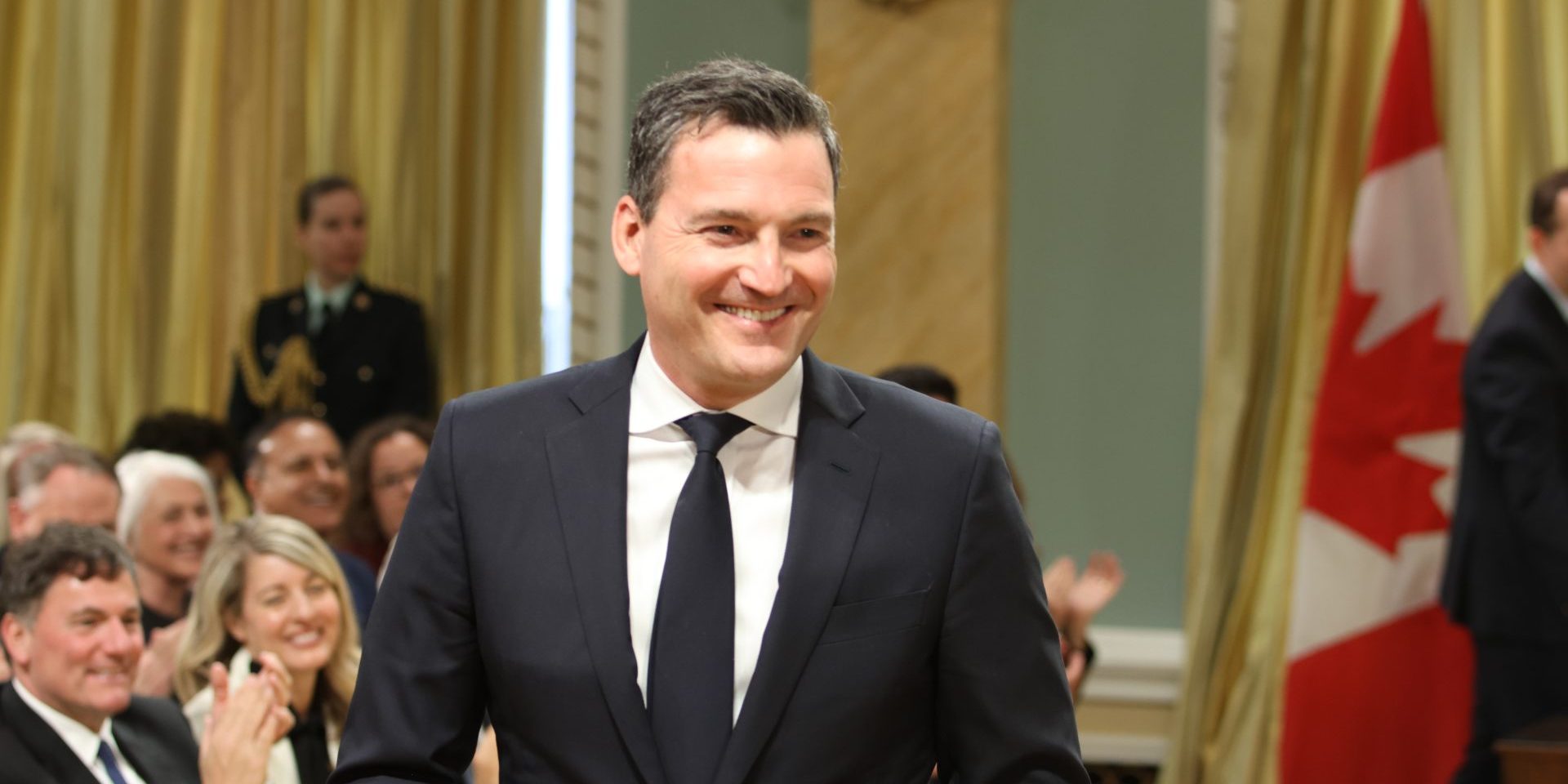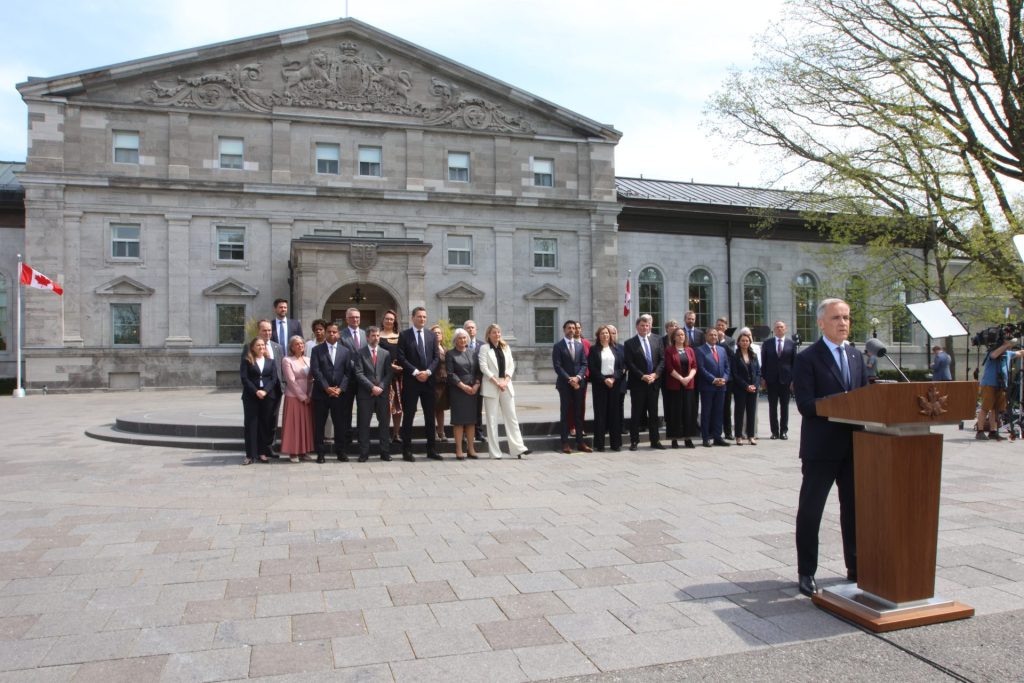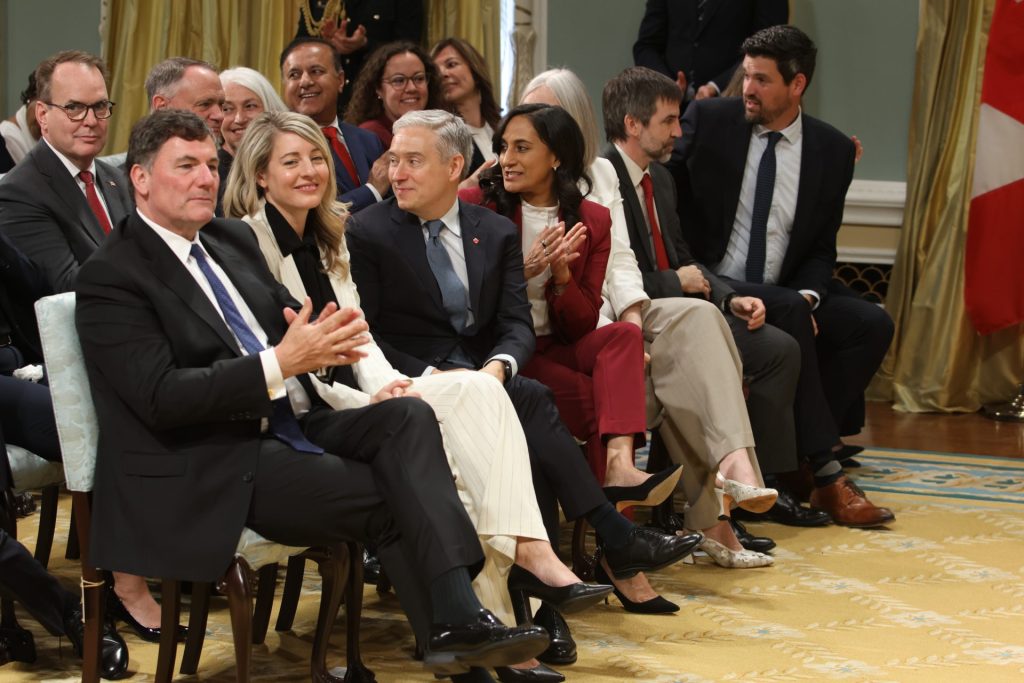Researcher, advocacy group hoping for ‘cabinet co-ordination’ on digital files with new AI and digital innovation ministry

Digital researchers and advocacy groups are expressing initial support for the newly created federal artificial intelligence and digital innovation portfolio in Prime Minister Mark Carney’s cabinet, applauding the separation of issues that have historically fallen under the purview of the industry minister.
Stepping into cabinet is first-time MP Evan Solomon (Toronto Centre, Ont.), who was named Minister of Artificial Intelligence and Digital Innovation and Minister responsible for the Federal Economic Development Agency for Southern Ontario.
“We welcome the creation of this new minister,” said OpenMedia executive director Matt Hatfield, said in an interview with The Wire Report. “It’s positive to create a bit more space between [artificial intelligence] and [Innovation, Science and Economic Development Canada] ISED.”
Hatfield highlighted the government’s previous attempt at AI legislation, Bill C-27, and called on Solomon, if he does take the lead on returning to the issue, to conduct a “thorough public consultation on getting AI regulation right.”
‘Makes sense to combine AI with digital innovation,’ says Queen’s professor
Ryan Grant, an assistant professor at Queen’s University who specializes in AI and supercomputing, said Solomon’s potential mandate is so “variable,” as it includes AI and digital innovation.
“I think it’s great that we’re taking some time to look at and concentrate on AI as a big thing in the future. I think it makes sense to combine AI with digital innovation because those two go hand-in-hand as well.
“Innovation is driving productivity, taking things from the lab, and making them something useful, productive, and marketable,” Grant said, “so I think those two things go together really, really well.”
Grant believes Canada is doing well on the AI research front, saying the country has some of the world’s best AI researchers. He would like to see Solomon concentrate more on infrastructure, saying it is “not just about buying more computers”
“It’s actually kind of difficult to put these things together. It requires a very specialized expertise that not a lot of people in the world have.”
“As we discover new things in AI we can actually monetize them and turn them into things to complete that innovation pipeline,” Grant said.
“It’s not just about building a really big data centre, it’s about having people who understand it and can help you figure out why your AI model isn’t scaling, how it can actually be run at a very large scale. That’s a challenge too, and I’d love to see them take an approach that would help us accelerate that.”

Grant sees himself as an example of someone who left Canada and went to the United States to get into the large extreme-scale infrastructure, though he did return to “help the country,” he said. When asked why he thinks people leave Canada seeking greater opportunities in AI, he noted the U.S. has “the really big toys.”
“It has really big systems where you can do the really impactful work. If we had those same things I think we could significantly increase our retention on that side…”
Grant is not overly concerned that the AI portfolio nor Solomon are backed by a dedicated department.
“I don’t think we’re worried about loss of support with the breakout, I think it’s just a different group of people with a specific specialty. ISED already had some interest in AI and they were already tracking this so I imagine it’s going to be just an expanded set of individuals in that space, just because it’s been such an important file,” he said.
“It’s a very welcome move, and I think it’s a strong signal AI policy and innovation policy [are at] the center of the government’s priorities,” said Florian Martin-Bariteau, University of Ottawa law professor and director of the AI + Society Initiative, in an interview with The Wire Report.

Martin-Bariteau has been pushing for a “whole of government” approach to digital issues, and said he hopes that Solomon’s new role is a sign that Canada will see such an approach from its leadership.
“But we need to wait for the mandate letters to know what this portfolio will exactly be,” he said, raising questions about what Solomon’s focus will be compared to other ministers that might have overlapping responsibilities.
The last government saw some “weird things happening” between departments, said Martin-Bariteau.
He pointed to conflicts between past legislative proposals around managing online platforms’ algorithms and content moderation, noting that both the proposed online harms act’s “digital safety commission,” as well as the AI regulations that would have been introduced through Bill C-27, proposed to tackle the same problems.
“So, at the same time, you had two departments bringing forward two different approaches with two different regulators to tackle the same issue,” said Martin-Bariteau.
“We’re lacking cabinet coordination on digital files,” he continued, asking whether those bills, if reintroduced, would now fall under the AI minister’s portfolio or remain with other ministers.
Hatfield echoed Martin-Bariteau’s concerns.
“We hope that there will be a more whole of government approach to getting digital policy right, and that it won’t just be different ministries going on their own adventures,” he said, “because having just heritage or just justice lead particular files has led to a certain amount of confusion and incoherency in past policy.”
Joly, Guilbeault take on industry and culture portfolios
Melanie Joly (Ahuntsic-Cartierville, Que.) has traded positions with Anita Anand (Oakville, Ont.), taking over as minister of industry and minister responsible for Canada Economic Development for Quebec Regions. Anand has been appointed minister of foreign affairs, a position Joly had held since 2021.
Steven Guilbeault (Laurier–Sainte-Marie, Que.) will stay on as minister of Canadian identity and culture and Minister responsible for official languages. He took the position during Carney’s brief first cabinet on March 14. The renamed portfolio was previously known as Canadian Heritage. The Quebec Liberal served as Heritage Minister from 2019 to 2021 and took over from former minister Pascale St-Onge.
“Canada’s new ministry is built to deliver the change Canadians want and deserve,” said Carney in a written statement. “Everyone is expected and empowered to show leadership — to bring new ideas, a clear focus, and decisive action to their work.”
Telecom, broadcasting sectors welcome Joly, Guilbeault
The Canadian Telecommunications Association congratulated Joly on her appointment and pledged to work with her.
“A stronger and more productive Canadian economy depends on the expansion and enhancement of our world-class telecommunications networks,” it said in a statement to The Wire Report. “We look forward to working with Minister Joly to ensure Canada maintains a stable regulatory environment that fosters the necessary investment to meet Canadians’ increasing demand for advanced telecommunications that support the modernization of our economy.”
Those concerned with broadcasting were excited about Guilbeault’s return to the culture portfolio. The Canadian Association of Broadcasters (CAB) was bullish on all of the cabinet but especially the returning minister.
“The CAB is happy to see the new and refreshed ministry announced today by Prime Minister Carney,” Association president Kevin Desjardins wrote in an email to The Wire Report. “We look forward to the opportunity to work again with Minister Steven Guilbeault and his cabinet colleagues on ensuring the sustainability of the Canadian owned and controlled broadcasting sector, and identifying ways to help keep journalists in professional newsrooms.”
The Canadian Media Producers Association (CMPA) heralded the Quebec minister’s return.
“Minister Guilbeault’s strong voice at the cabinet table will be especially critical in the months ahead,” president Reynolds Mastin said in a statement. “It has never been more important for Canada’s government to stand up for our national culture and identity, particularly in the face of President Donald Trump’s unjustified trade threats and attacks on our sovereignty.”
The CMPA vowed to work with the minister on such topics as strengthening CBC/Radio–Canada, increasing funding to the Canada Media Fund and Telefilm Canada and protecting cultural sovereignty when Canada enters trade negotiations with the United States.
This piece was updated with additional comment, and republished from The Wire Report, which covers the intersection of business, technology, and government, with a special focus on the regulatory sphere. Sign up here.
The Hill Times





 LICENSING
LICENSING PODCAST
PODCAST ALERTS
ALERTS













